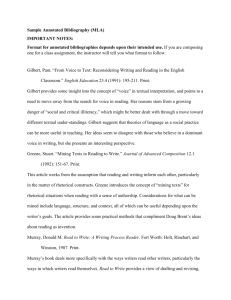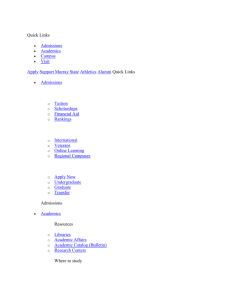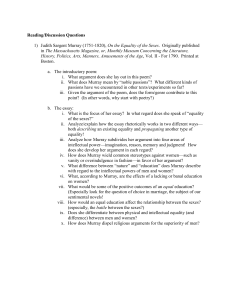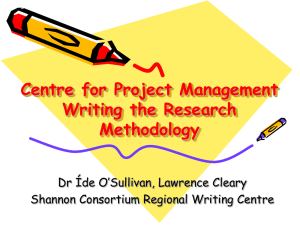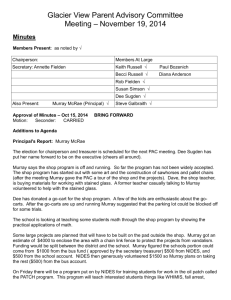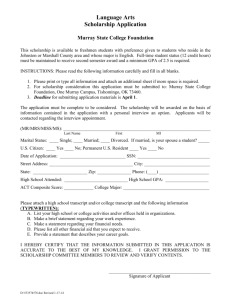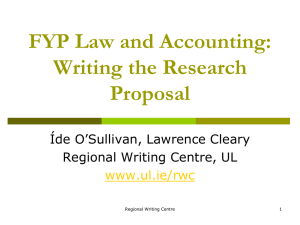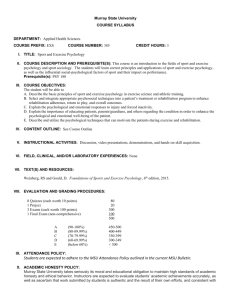click here - Gilbert Murray Trust
advertisement
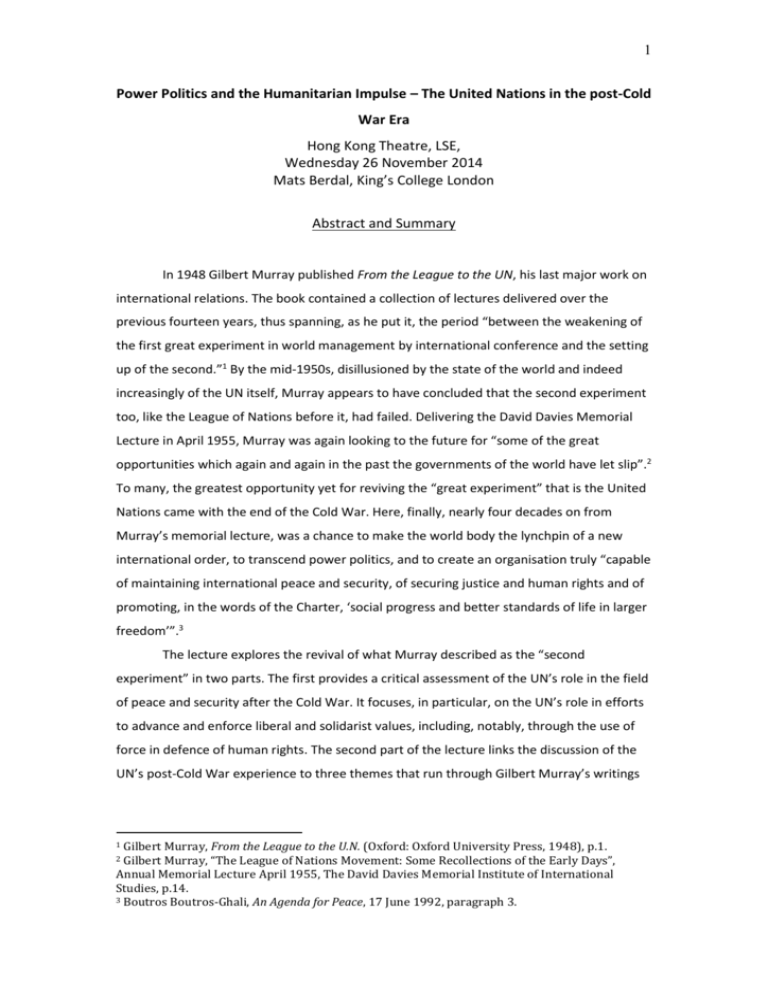
1 Power Politics and the Humanitarian Impulse – The United Nations in the post-Cold War Era Hong Kong Theatre, LSE, Wednesday 26 November 2014 Mats Berdal, King’s College London Abstract and Summary In 1948 Gilbert Murray published From the League to the UN, his last major work on international relations. The book contained a collection of lectures delivered over the previous fourteen years, thus spanning, as he put it, the period “between the weakening of the first great experiment in world management by international conference and the setting up of the second.”1 By the mid-1950s, disillusioned by the state of the world and indeed increasingly of the UN itself, Murray appears to have concluded that the second experiment too, like the League of Nations before it, had failed. Delivering the David Davies Memorial Lecture in April 1955, Murray was again looking to the future for “some of the great opportunities which again and again in the past the governments of the world have let slip”.2 To many, the greatest opportunity yet for reviving the “great experiment” that is the United Nations came with the end of the Cold War. Here, finally, nearly four decades on from Murray’s memorial lecture, was a chance to make the world body the lynchpin of a new international order, to transcend power politics, and to create an organisation truly “capable of maintaining international peace and security, of securing justice and human rights and of promoting, in the words of the Charter, ‘social progress and better standards of life in larger freedom’”.3 The lecture explores the revival of what Murray described as the “second experiment” in two parts. The first provides a critical assessment of the UN’s role in the field of peace and security after the Cold War. It focuses, in particular, on the UN’s role in efforts to advance and enforce liberal and solidarist values, including, notably, through the use of force in defence of human rights. The second part of the lecture links the discussion of the UN’s post-Cold War experience to three themes that run through Gilbert Murray’s writings Gilbert Murray, From the League to the U.N. (Oxford: Oxford University Press, 1948), p.1. Gilbert Murray, “The League of Nations Movement: Some Recollections of the Early Days”, Annual Memorial Lecture April 1955, The David Davies Memorial Institute of International Studies, p.14. 3 Boutros Boutros-Ghali, An Agenda for Peace, 17 June 1992, paragraph 3. 1 2 2 on international relations: (1) the problem of war; (2) the role and workings of international organisation; and (3) the relationship between democracy and international order. Gilbert Murray is commonly associated with the “idealist”, or what E.H. Carr termed the “Utopian”, phase of theorising about international relations. Variously described as a “school, vision, approach, tradition, or paradigm”,4 there is, as revisionist scholars of the discipline have shown, far more nuance and complexity to the “idealist” label and the positions held by many internationalist writers between the two world wars, including Gilbert Murray, than E.H. Carr would have us believe. Even so, many of the criticisms – some of them fundamental – levelled against them were plainly valid. Chief among these was their failure to engage with the realities of power and hierarchy in international relations and, linked to this, to explore critically and systematically the sources of state conduct. The postCold War history of the UN confirms the validity of this criticism: in a system of sovereign states, whose constituent units display enormous diversity in terms of resources, political forms, historical experience and cultural specificities, power politics cannot be transcended by an act of will. At the same time, this does not mean that the insights and thoughts of writers such as Gilbert Murray are of no value to our understanding of contemporary international relations, that their writings, in Hedley Bull’s harsh verdict, are only of interest for the light they cast on “the preoccupations and presuppositions of [their] place and time”.5 The history of the UN since the late 1980s shows that the issues with which Murray grappled have not gone away, that his concerns are still our concerns. Even though there are weaknesses and failings in his understanding of international politics, the very act of engaging with his work forces us to think more deeply about the subject today. Moreover, in addition to stimulating our thinking about the problem of war, democracy and international order, there are aspects of the UN’s post-Cold War history which Murray’s writings anticipate, and which he would likely have welcomed as evidence of progress in international relations. Thus, while there is no agreement among states on the rights and wrongs of humanitarian intervention, the UN may still be viewed as having played (and is likely to continue to play) a central role in articulating, promoting and seeking to universalise the important justice-related norms of the Charter. As of late 2014, some 120,00 peacekeepers remain deployed in conflict zones around the world, and many of the UN’s Peter Wilson, The International Theory of Leonard Woolf: A Study in Twentieth-Century Idealism (New York: Palgrave Macmillan, 2003) p.14. 5 Hedley Bull, “The Theory of International Politics, 1919-1969”, in Brian Porter (ed), The Aberystwyth Papers: International Politics, 1919-1969, OUP), p.185-6. 4 3 specialised agencies – notably the World Food Programme, UNICEF and UNHCR – remain indispensable to international efforts aimed at containing and mitigating the consequences of war, conflict and natural disasters. The organisation also continues to serve as a vitally important arena and convening forum for addressing issues – from climate change and drugs control to infectious diseases – that cannot be tackled by Member States alone. None of this, of course, amounts to a “solidarist consensus” in international society, a fact that would probably not, after all, have surprised Gilbert Murray. As he perceptively observed of the prospects for the second great experiment in world management by international conference, “like most human effort”, this too was likely to end “in a confused mixture between success and failure.” _____________________
